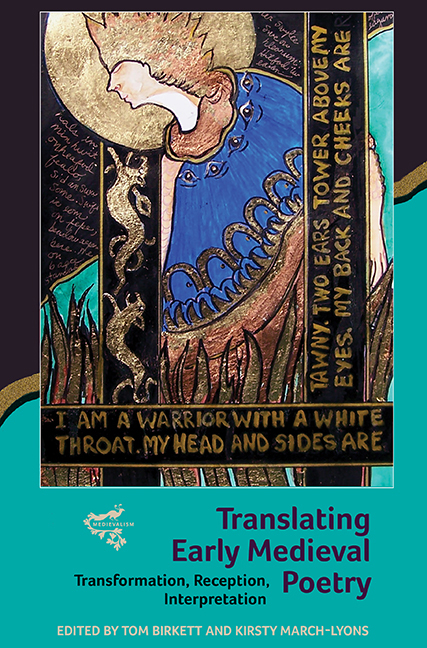Book contents
- Frontmatter
- Contents
- Acknowledgements
- Contributors
- Introduction: From Eald to New
- 1 From Eald Old to New Old: Translating Old English Poetry in(to) the Twenty-first Century
- 2 Edwin Morgan's Translations of Anglo-Saxon Poetry: Turning Eald into New in English and Scots
- 3 Gains and Losses in Translating Old English Poetry into Modern English and Russian
- 4 Borges, Old English Poetry and Translation Studies
- 5 ‘Let Beowulf now be a book from Ireland’: What Would Henryson or Tolkien Say?
- 6 The Forms and Functions of Medieval Irish Poetry and the Limitations of Modern Aesthetics
- 7 Aislinge Meic Conglinne: Challenges for Translator and Audience
- 8 Translating Find and the Phantoms into Modern Irish
- 9 Reawakening Angantýr: English Translations of an Old Norse Poem from the Eighteenth Century to the Twenty-first
- 10 Translating and Retranslating the Poetic Edda
- 11 From Heroic Lay to Victorian Novel: Old Norse Poetry about Brynhildr and Thomas Hardy's The Return of the Native
- 12 Michael Hirst's Vikings and Old Norse Poetry
- Afterword
- A Translation of Riddle 15 from the Exeter Book
- Bibliography
- Index
- Miscellaneous Endmatter
3 - Gains and Losses in Translating Old English Poetry into Modern English and Russian
Published online by Cambridge University Press: 01 September 2018
- Frontmatter
- Contents
- Acknowledgements
- Contributors
- Introduction: From Eald to New
- 1 From Eald Old to New Old: Translating Old English Poetry in(to) the Twenty-first Century
- 2 Edwin Morgan's Translations of Anglo-Saxon Poetry: Turning Eald into New in English and Scots
- 3 Gains and Losses in Translating Old English Poetry into Modern English and Russian
- 4 Borges, Old English Poetry and Translation Studies
- 5 ‘Let Beowulf now be a book from Ireland’: What Would Henryson or Tolkien Say?
- 6 The Forms and Functions of Medieval Irish Poetry and the Limitations of Modern Aesthetics
- 7 Aislinge Meic Conglinne: Challenges for Translator and Audience
- 8 Translating Find and the Phantoms into Modern Irish
- 9 Reawakening Angantýr: English Translations of an Old Norse Poem from the Eighteenth Century to the Twenty-first
- 10 Translating and Retranslating the Poetic Edda
- 11 From Heroic Lay to Victorian Novel: Old Norse Poetry about Brynhildr and Thomas Hardy's The Return of the Native
- 12 Michael Hirst's Vikings and Old Norse Poetry
- Afterword
- A Translation of Riddle 15 from the Exeter Book
- Bibliography
- Index
- Miscellaneous Endmatter
Summary
TRANSLATION HAS TRADITIONALLY been divided into two types: that on a spatial axis, from one language to another, and that on a chronological axis, within one language of different periods. In contrast to cross-lingual translations, which have been thoroughly analysed, defined and exemplified, the complexities of translation between historical stages of the same language have not yet received enough scholarly attention. Diachronic translation presupposes translation into the same language but of a later period. It might seem at first sight that translations of Old English poetry into Modern English belong to the sphere of diachronic translation, especially if we take into account the historical identity of the language of the original and the translation.
Diachronic translation implies not only the identity of the language of the original text and the translation but also the identity of the poetic systems of both texts with all their phonetic, prosodic, metrical, lexical, grammatical and syntactic constituents. However, looking at Old English and Modern English poetic systems, it is impossible not to notice that Old English alliterative verse and Modern English accentual-syllabic verse derive from different roots and are thus historically dissimilar. Alliterative verse, as is well known, did not survive the Norman Conquest, when not only extra-linguistic (the break in the literary tradition) but also linguistic changes put an end to the old poetic tradition. In the thirteenth and fourteenth centuries attempts were made to revive alliterative verse, but by the end of the fourteenth century it was forever ousted by accentual-syllabic verse which was confirmed by acquaintance with French and Italian poetic systems. The history of English verse begins anew, and it is Middle English poetics that serve as the basis of its development.
In contrast to modern syllabic-tonic versification, Old English alliterative verse is characterised by a tight unity of verse and language. If in modern poetic texts the form is to some extent extrinsic to the language, in alliterative verse the two are indivisible. Alliterative technique does not deform the language but moulds it in a special way, so that not only is the language organised by the alliterative verse, but the verse requires particular linguistic conditions.
- Type
- Chapter
- Information
- Translating Early Medieval PoetryTransformation, Reception, Interpretation, pp. 46 - 60Publisher: Boydell & BrewerPrint publication year: 2017



